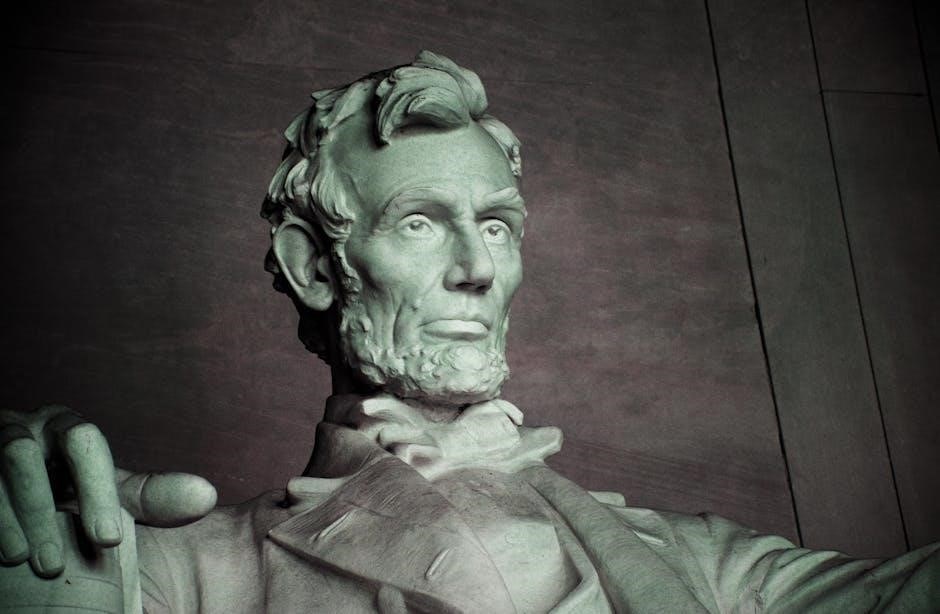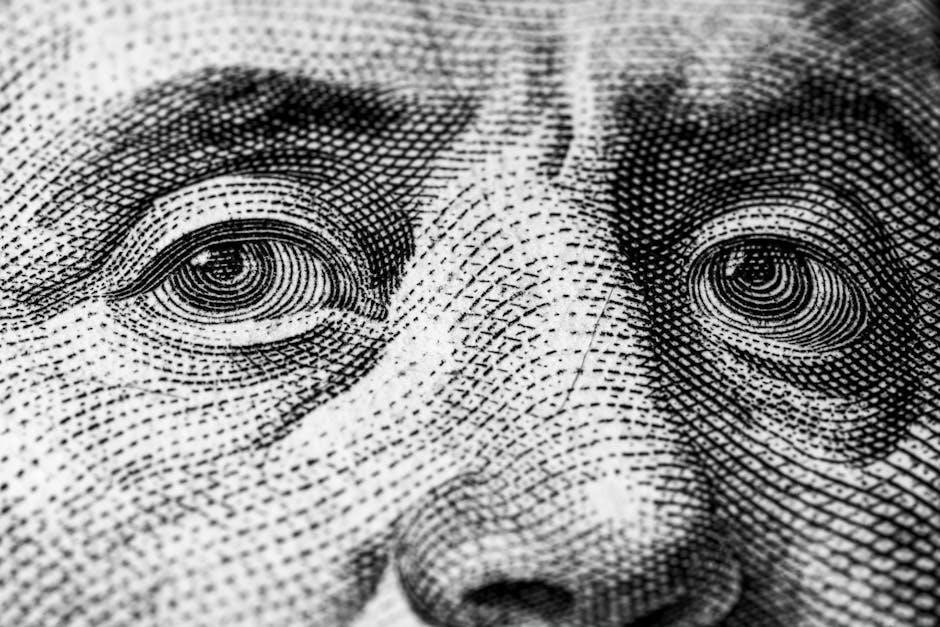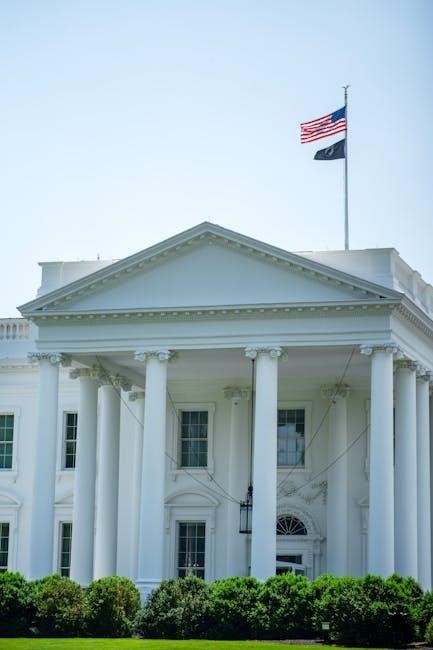This guide explores the 1995 film The American President, blending romance, comedy, and politics. It analyzes key roles, themes, and legislative agendas, offering insights into leadership and personal relationships while providing study materials and trivia for deeper engagement.
Overview of the Movie and Its Significance
The American President (1995), directed by Rob Reiner, blends romance, comedy, and politics. Starring Michael Douglas as President Andrew Shepherd, the film explores his dual role as a widowed father and a political leader. It highlights themes of leadership, personal sacrifice, and public perception, offering a relatable yet idealized portrayal of the presidency. The movie’s balance of humor and heart makes it a timeless commentary on love, power, and governance.
Objectives of the Movie Guide
This guide aims to enhance understanding of The American President by analyzing the President’s roles, political themes, and personal relationships. It provides questions for reflection, trivia, and insights into leadership and governance. The objectives include identifying key themes, exploring character dynamics, and fostering critical thinking about the intersection of politics and personal life in the film.

The President’s Roles in “The American President”
This section examines the President’s portrayal in six distinct roles: Leader, Widow, Father, Politician, Romantic Partner, and Public Figure, highlighting his multifaceted character in the film.
The President as a Leader
President Andrew Shepherd is depicted as a strong, strategic leader navigating complex political challenges. His leadership is evident in advocating for the crime bill and environmental lobby, showcasing his commitment to public welfare. Despite facing political opposition and declining approval ratings, he remains determined, demonstrating resilience and a clear vision for the nation’s future.
The President as a Widow
President Andrew Shepherd is portrayed as a widower, deeply affected by the loss of his wife. His role as a single father to his daughter, Lucy, highlights his emotional depth and commitment to family. Balancing personal grief with presidential duties, he embodies resilience, showcasing how personal loss shapes his leadership and public image while navigating political and personal challenges.
The President as a Father
President Shepherd’s paternal role is central to his character, as he navigates single parenthood. His daughter, Lucy, brings emotional depth, illustrating his balancing act between political responsibilities and personal life. Despite the demands of the presidency, he remains devoted, showing vulnerability and humanity. This duality underscores his relatability, making him a well-rounded leader and compassionate father, enriching the film’s narrative with genuine warmth.
The President as a Politician
President Shepherd excels as a skilled politician, balancing policy and public opinion. His leadership focuses on passing the crime bill and environmental initiatives, showcasing his legislative priorities. Despite challenges, he navigates political pressures effectively, maintaining high approval ratings. His strategic decisions highlight his ability to manage Congress and public perception, emphasizing his role as a pragmatic leader committed to meaningful change.
The President as a Romantic Partner
President Shepherd’s romance with Sydney Wade highlights his vulnerability and humanity. Despite his political prominence, their relationship is portrayed as genuine and heartfelt. The challenges of dating as a president, including media scrutiny, underscore his balancing act between personal life and public duties, revealing a relatable and endearing character beyond the Oval Office.
The President as a Public Figure
As a public figure, President Shepherd is scrutinized for his decisions and personal life. His approval ratings influence support for policies like the crime bill and environmental lobby. The media amplifies his actions, shaping public perception. His role as a leader and romantic partner intertwines, making him a relatable yet complex figure. His choices drive both political outcomes and personal consequences, reflecting the challenges of balancing public and private life.

Key Characters in “The American President”
- Andrew Shepherd: The President of the United States, balancing leadership and personal life as a widower and father.
- Sydney Ellen Wade: A lobbyist who becomes romantically involved with the President, challenging his public image.
- Robin McCall: The President’s press secretary, managing media and public perception.
- AJ: The Chief of Staff, navigating political strategies and personal dynamics.
Andrew Shepherd
Andrew Shepherd is the President of the United States, portrayed as a widower and father to his young daughter. He is charismatic, intelligent, and deeply committed to his duties, yet struggles with balancing his personal life and political responsibilities. His leadership is tested as he navigates the challenges of passing a crime bill and maintaining public approval while pursuing a romantic relationship with lobbyist Sydney Ellen Wade.
Sydney Ellen Wade
Sydney Ellen Wade is a passionate environmental lobbyist who captures President Andrew Shepherd’s attention. Her intelligence and dedication inspire him, leading to a romantic connection. As an outsider in the political arena, she challenges Shepherd’s perspectives, forcing him to balance his personal feelings with his presidential duties, while her presence sparks both admiration and scrutiny in the public eye.
Robin McCall
Robin McCall is President Andrew Shepherd’s loyal and sharp-witted press secretary. She skillfully navigates media scrutiny, protecting the President’s image while maintaining his approval ratings. Robin’s quick thinking and strong communication skills are essential in managing crises, showcasing her dedication and expertise in handling the pressures of the White House’s public relations challenges with precision and grace.
AJ
AJ is President Andrew Shepherd’s trusted and experienced Chief of Staff. He is a master strategist, balancing the demands of the presidency with the administration’s goals. AJ’s pragmatic approach and sharp political instincts help navigate legislative challenges, ensuring the President’s agenda moves forward despite the complexities of Washington politics and personal distractions faced by Shepherd throughout the film.

Political Themes and Legislative Agenda
The film highlights key legislative efforts, including the crime bill and environmental lobby, while exploring how approval ratings influence political strategy and public support for policies.
The Crime Bill
The crime bill is a central legislative focus, reflecting the administration’s commitment to public safety. Its passage hinges on political strategies and shifting approval ratings, as bipartisan support wanes amid debates over effectiveness and cost. The President’s leadership is tested as he navigates Congress, balancing tough-on-crime measures with social reform, illustrating the complexities of governance and compromise.
The Environmental Lobby
Sydney Ellen Wade, representing an environmental group, pushes for stricter pollution controls and renewable energy initiatives. Her efforts challenge the administration’s legislative agenda, highlighting the tension between economic interests and ecological responsibility. The President must balance political alliances with his personal beliefs, showcasing the complexities of policy-making and the influence of lobbying on public policy decisions and outcomes.
Approval Ratings and Public Perception
The President’s high approval ratings initially support his crime bill, but they decline as his personal life faces scrutiny. Public perception shifts due to media coverage of his relationship with Sydney and political attacks. The administration struggles to maintain support, showing how approval ratings directly impact legislative success and political strategies to regain public trust and stabilize the presidency.

Romance and Personal Relationships
The film explores President Shepherd’s blossoming romance with Sydney Wade, balancing professional duties with personal feelings. His role as a widower and father adds emotional depth, while his relationship with Sydney faces scrutiny, highlighting the challenges of dating as a President and the impact on public perception and political standing.
The Relationship Between Andrew Shepherd and Sydney Ellen Wade
Andrew Shepherd and Sydney Wade’s relationship evolves from professional admiration to romantic connection. Despite their mutual attraction, challenges arise due to Andrew’s presidential duties and public scrutiny. Their bond is tested by political pressures, personal vulnerabilities, and the scrutiny of the media, showcasing the intricate balance between love and leadership in the public eye. Sydney’s influence on Andrew is profound, both personally and politically, while Andrew offers her a sense of stability and understanding, creating a dynamic that enriches both their lives amidst the chaos of the White House.
Challenges of Dating as a President
Dating as a president presents unique challenges, including intense media scrutiny, political repercussions, and balancing public duties with personal life. Privacy is scarce, and every interaction is analyzed, impacting approval ratings and legislative agendas. Maintaining a relationship requires navigating these complexities while keeping personal feelings private, highlighting the sacrifices inherent in holding the nation’s highest office.
Media and Public Perception
The media plays a crucial role in shaping public opinion, scrutinizing the president’s actions, and influencing approval ratings. Managing press relations is vital for political survival and legislative success.
The Role of the Press in Shaping Public Opinion
The press significantly influences public perception by framing narratives around the president’s decisions and personal life. Media scrutiny affects approval ratings, as seen with Shepherd’s declining support for the crime bill; Effective press management becomes crucial for maintaining political capital and advancing legislative agendas.
Handling Media Scrutiny
In The American President, the media intensifies scrutiny of Shepherd’s personal and political life. Press conferences and leaks challenge his image, forcing strategic responses. The film highlights the delicate balance between transparency and control, as Shepherd navigates public perception while maintaining his presidential demeanor and advancing his agenda amidst constant media pressure.

Climax and Resolution
The climax features President Shepherd’s bold speech defending his principles. The resolution ties together personal and political victories, with Shepherd finding love and legislative success, embodying leadership triumph.
Key Turning Points in the Movie
The film’s pivotal moments include President Shepherd’s decision to attack Libya, the introduction of the crime bill, and Sydney Wade’s environmental lobbying efforts. Another turning point is the press conference where Shepherd defends his personal life and policies. The State Dinner and Shepherd’s final speech to Congress are also critical, showcasing his leadership and personal growth.
- The President’s bold decision to attack Libya after a terrorist attack.
- Shepherd’s press conference where he addresses personal and political scrutiny.
- The introduction of the crime bill and its impact on his approval ratings.
- Sydney Wade’s lobbying efforts and her growing influence on Shepherd.
- The State Dinner, highlighting the blending of politics and romance.
- Shepherd’s final speech to Congress, solidifying his legacy and principles.
How the Movie Ends
The film concludes with President Andrew Shepherd delivering a powerful speech to Congress, reaffirming his commitment to justice and the environment. His approval ratings soar, and the crime bill passes; Personally, he and Sydney Ellen Wade embrace their relationship, symbolizing a balance between leadership and love. The ending is hopeful, showcasing Shepherd’s growth as both a leader and a man.

Trivia and Discussion Questions
Discover fun facts and engage with questions about the film, such as its trivia, character dynamics, and legislative themes, fostering deeper discussion and analysis.
Fun Facts About the Movie
The American President is a 1995 romantic-comedy directed by Rob Reiner. The film was written by Aaron Sorkin, who later created The West Wing. Michael Douglas stars as President Andrew Shepherd, while Annette Bening plays Sydney Wade. The movie seamlessly blends romance, comedy, and political drama, offering a charming yet idealistic portrayal of the presidency. Its witty dialogue and relatable characters have made it a timeless classic, inspiring many political dramas that followed.
Questions for Further Discussion
How does President Shepherd’s leadership style influence his decision-making?
What role does public perception play in shaping his political agenda?
How does the film portray the challenges of balancing personal and political life?
What message does the movie convey about the impact of approval ratings on governance?
How does Sydney Ellen Wade’s character influence the President’s actions and policies?
What does the film suggest about the relationship between politics and romance?
How does the ending reflect the film’s themes of compromise and leadership?



